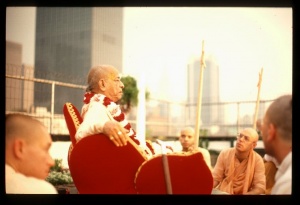SB 2.5.31

A.C. Bhaktivedanta Swami Prabhupada
TEXT 31
- taijasāt tu vikurvāṇād
- indriyāṇi daśābhavan
- jñāna-śaktiḥ kriyā-śaktir
- buddhiḥ prāṇaś ca taijasau
- śrotraṁ tvag-ghrāṇa-dṛg-jihvā
- vāg-dor-meḍhrāṅghri-pāyavaḥ
SYNONYMS
taijasāt — by the passionate egoism; tu — but; vikurvāṇāt — transformation of; indriyāṇi — the senses; daśa — ten; abhavan — generated; jñāna-śaktiḥ — the five senses for acquiring knowledge; kriyā-śaktiḥ — the five senses of activities; buddhiḥ — intelligence; prāṇaḥ — the living energy; ca — also; taijasau — all products of the mode of passion; śrotram — the sense for hearing; tvak — the sense for touching; ghrāṇa — the sense for smelling; dṛk — the sense for seeing; jihvāḥ — the sense for tasting; vāk — the sense for speaking; doḥ — the sense for handling; meḍhra — the genitals; aṅghri — the legs; pāyavaḥ — the sense for evacuating.
TRANSLATION
By further transformation of the mode of passion, the sense organs like the ear, skin, nose, eyes, tongue, mouth, hands, genitals, legs, and the outlet for evacuating, together with intelligence and living energy, are all generated.
PURPORT
The living condition in material existence depends more or less on one's intelligence and powerful living energy. Intelligence to counteract the hard struggle for existence is assisted by the senses for acquiring knowledge, and the living energy maintains himself by manipulating the active organs, like the hands and legs. But on the whole, the struggle for existence is an exertion of the mode of passion. Therefore all the sense organs, headed by intelligence and the living energy, prāṇa, are different products and by-products of the second mode of nature, called passion. This mode of passion, however, is the product of the air element, as described before.